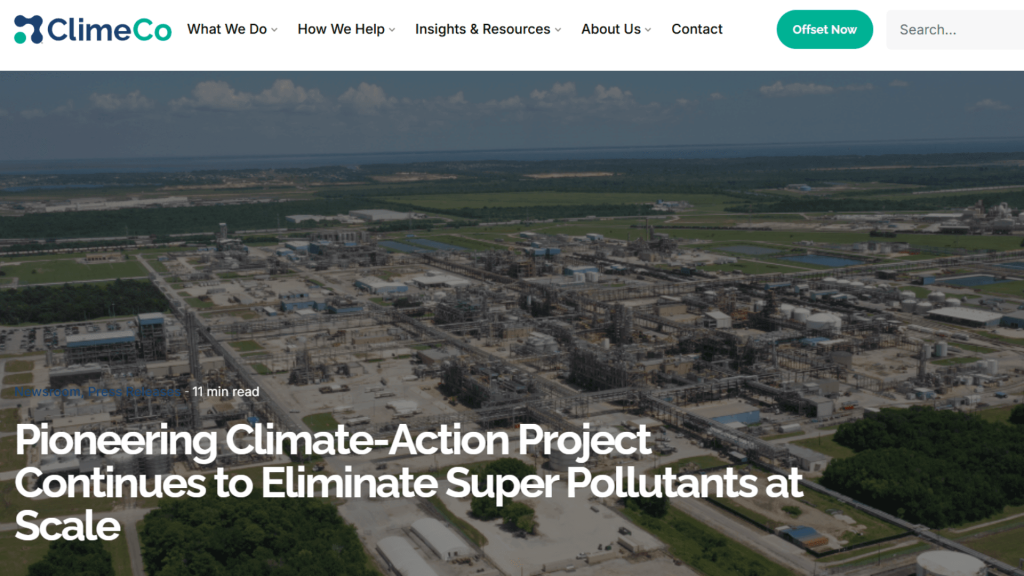• ClimeCo and Covestro surpass 10 million verified carbon credits through nitrous oxide abatement in Texas.
• Equivalent to removing 2.3 million gas-powered cars from the road for one year.
• One of the longest-running and most impactful industrial N2O abatement projects in the U.S., verified under the Climate Action Reserve.
ClimeCo and Covestro Drive Large-Scale Industrial Decarbonization
ClimeCo, a global leader in decarbonization, and Covestro, one of the world’s largest polymer materials manufacturers, have achieved a major climate milestone with their joint nitrous oxide (N2O) abatement project in Baytown, Texas. Operated by LSB Industries, the initiative has now generated over 10 million verified carbon credits, equivalent to 10 million tonnes of carbon dioxide emissions avoided.
Since its launch in 2010, the Baytown site has destroyed more than 36,000 metric tonnes of nitrous oxide — a greenhouse gas with 273 times the warming potential of carbon dioxide. The reductions have been verified under the Climate Action Reserve’s (CAR) N2O Abatement Protocol, which ensures rigorous validation and transparency across carbon markets.
“Covestro’s abatement efforts eliminate nitrous oxide at its source, creating permanent and irreversible reductions that improve both global climate outcomes and local air quality,” said Victor Ortega, Baytown Site Manager and Senior Vice President of Performance Materials & Operations North America at Covestro.


Proven Collaboration Across Industry Leaders
The project’s success rests on a long-term partnership between ClimeCo, Covestro, and LSB Industries. LSB operates and maintains the nitric acid unit at Covestro’s Baytown facility, where advanced catalytic technologies destroy nitrous oxide emissions before they reach the atmosphere.
“This has been a great collaborative effort by Covestro, ClimeCo, and our entire LSB Baytown team,” said Michael Griffin, General Manager of LSB. “It’s an example of what strong industrial partnerships can deliver in practical, measurable climate progress.”
ClimeCo, which develops and manages one of the largest portfolios of N2O abatement projects in the U.S., structured and verified the project’s emissions reductions. The company’s expertise has made it a key player in linking industrial-scale abatement to market-based climate finance mechanisms.
RELATED ARTICLE: ClimeCo Leads Development of First-Ever Low-Carbon Cement Protocol
Verified Impact and Market Credibility
All emissions reductions from the Baytown project are independently verified by the Climate Action Reserve, one of the most respected carbon registries in North America. The registry’s standards ensure environmental integrity and transparency — preventing double counting and reinforcing market trust.
With over 10 million carbon credits issued since 2010, the Baytown project remains one of the largest contributors to verified climate mitigation from a single industrial site in the U.S. “We’re proud to work alongside Covestro as they continue their sustainability journey,” said Erika Schiller, Senior Vice President of Project Development at ClimeCo. “This project reflects how high-integrity, high-impact solutions can deliver real environmental results while driving business value.”


Implications for Policy, Industry, and Markets
The Baytown abatement project offers a model for how industrial operations can meaningfully reduce emissions while supporting national and global climate goals. Nitrous oxide accounts for roughly 6% of global greenhouse gas emissions, and addressing it at the source remains one of the fastest, most effective routes to achieving large-scale reductions.
As regulatory and investor scrutiny grows, verified abatement projects like this one are expected to play a larger role in both voluntary and compliance markets. They not only contribute to corporate net-zero strategies but also demonstrate how technology and collaboration can address super pollutants with immediate effect.
A Template for Long-Term Climate Performance
Now entering its 15th year, the Baytown project demonstrates that industrial climate action can be both durable and profitable. The partnership between ClimeCo, Covestro, and LSB Industries provides a blueprint for other manufacturers seeking to align decarbonization with operational efficiency.
As global carbon markets expand and verification standards tighten, the project stands as evidence of how private-sector initiatives can deliver verifiable, scalable impact. For policymakers and investors, it reinforces the strategic value of industrial abatement — a reminder that climate progress at scale often begins not with sweeping pledges, but with proven, ongoing performance.
Follow ESG News on LinkedIn

